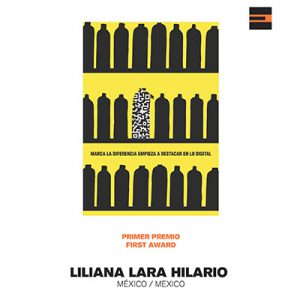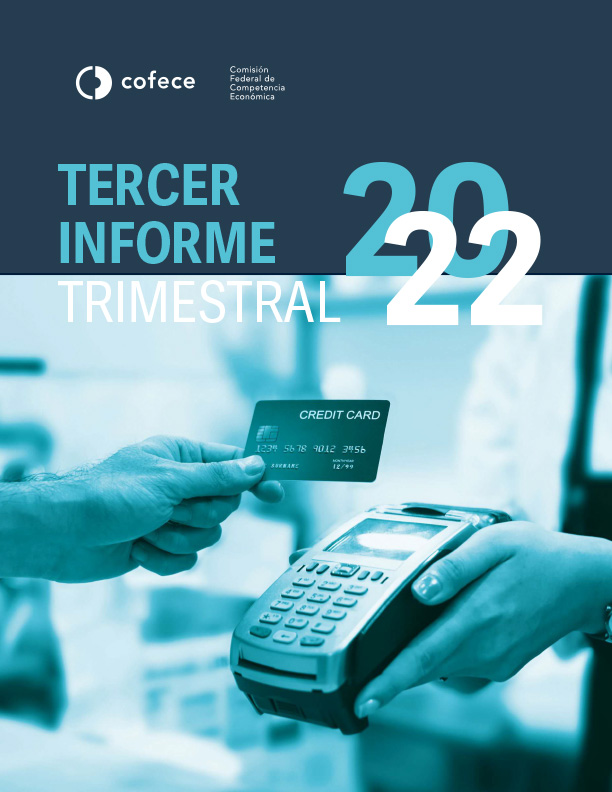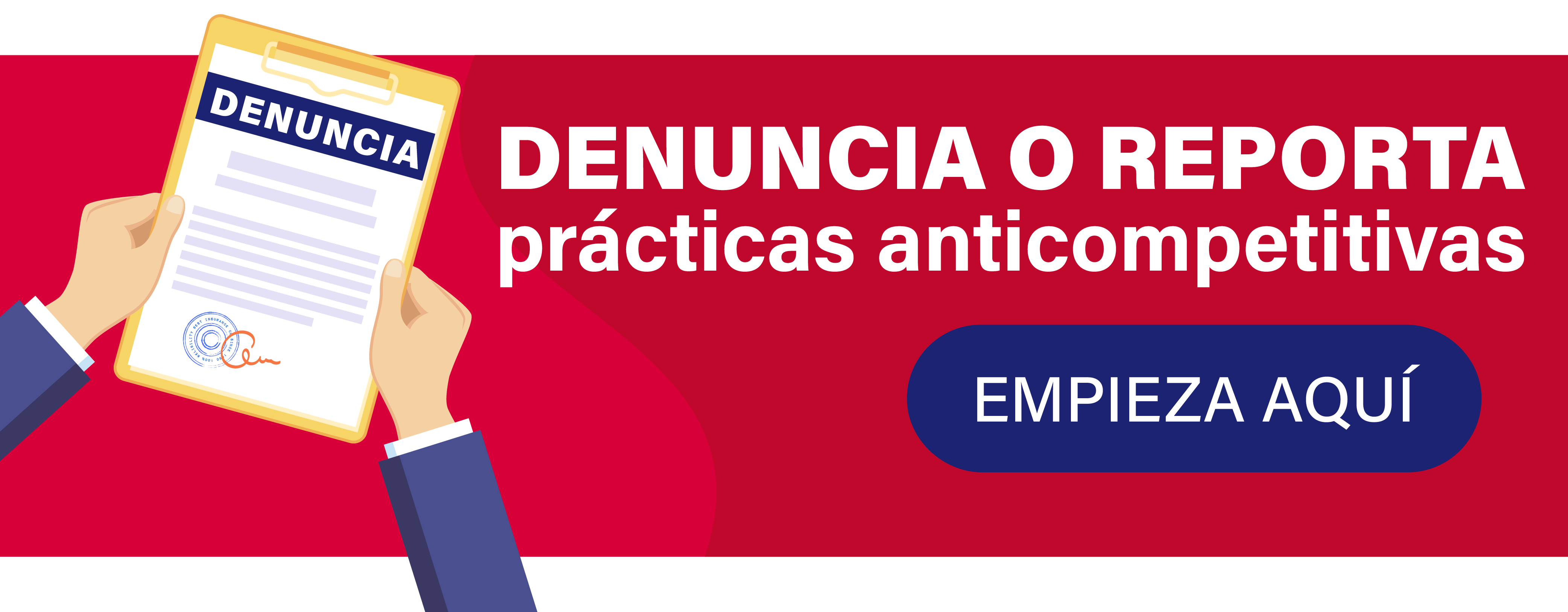¿Qué estás buscando?
¿Qué estás buscando?
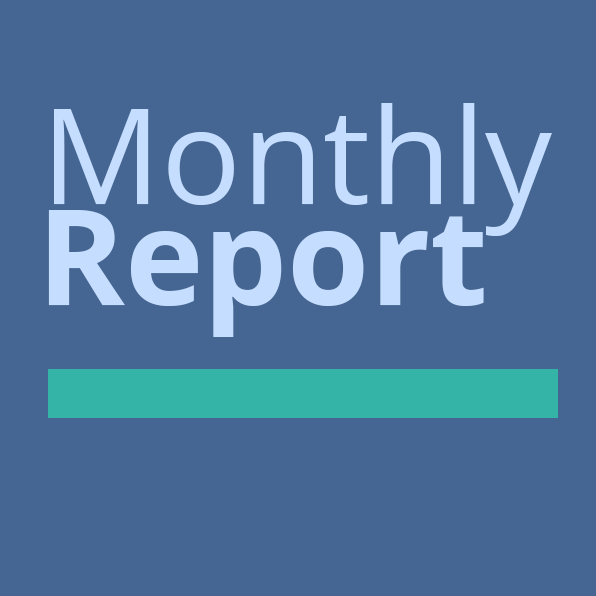
October 2022
Frontpage
Special procedures
Anticompetitive practices
Competition advocacy
Recommended reading
FRONTPAGE
Jornada por la Competencia 2022
Jornada por la Competencia 2022
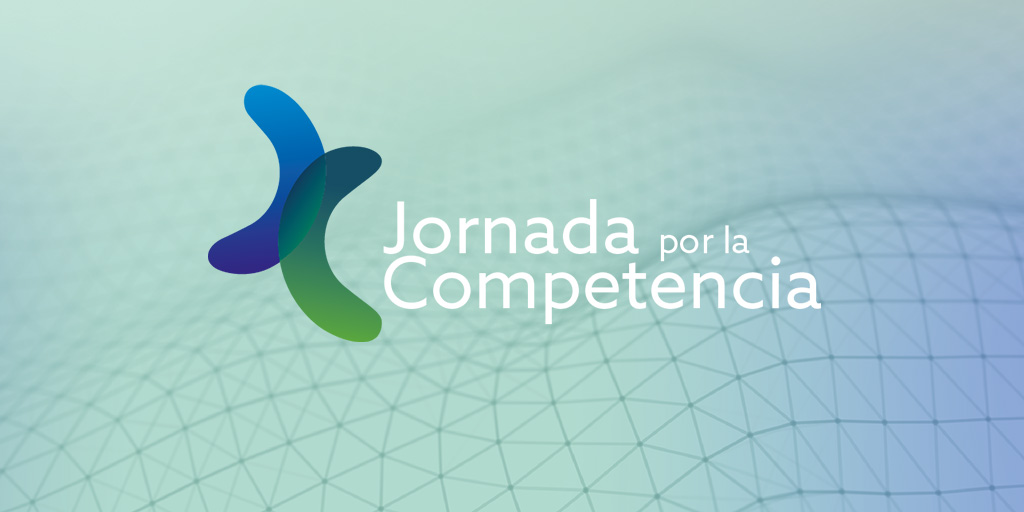
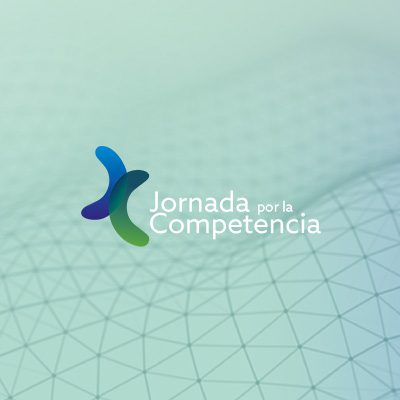
Economic competition is a powerful tool that contributes to improving the living conditions of Mexican families, especially those in the least favorable economic conditions, said Brenda Gisela Hernández Ramírez, Acting Chair Commissioner of the Federal Economic Competition Commission (Cofece or Commission), at the opening of the "Jornada por la Competencia, Financial Sector in Mexico: Challenges and Opportunities", which took place on October 26.
In her speech, she emphasized that the financial sector is one of the priority sectors of Cofece's 2022-2025 Strategic Plan and is fundamental, not only because of its size and complexity, but also because of its transversality, since it is used both by end users and in the development of other productive activities.
For his part, the Chair of the Competition Committee of the Organisation for Economic Cooperation and Development (OECD), Frédéric Jenny, spoke about Economic competition in the financial sector: challenges and opportunities, in which he assured that the recommendations on competition for Fintech presented by Cofece in recent years, facilitate the development of this type of companies.
He also considered that the regulators of the financial technology sector must work together to generate an adequate legal framework that will allow these new companies and traditional banks to compete "uniting all innovations to achieve financial stability".
In the Banking commissions and financial sector regulation panel, moderated by the independent consultant, Juan Pablo Graf, with the participation of José Luis Negrín Muñoz, General Director of Financial System Affairs of the Bank of Mexico (Banxico), Alfredo Navarrete Martínez, Head of the Banking, Securities and Savings Unit of the Ministry of Finance and Public Credit, and Arcelia Olea Leyva, Legal Director of Bancoppel; Alfredo Navarrete Martínez, Head of the Banking, Securities and Savings Unit of the Ministry of Finance and Public Credit, and Arcelia Olea Leyva, Legal Director of Bancoppel, agreed that the competitive pressure on traditional banks is driving them to innovate and be creative in designing new ways for society to acquire financial services that are appropriate to their needs.
During this panel, they pointed out that the use of these technologies can reduce the fees currently charged in traditional banking and, in this sense, regulation must have two fundamental objectives: to make transparent the concept for which they are being charged; and promote competition between financial institutions by allowing customers to compare fees between companies.
On the other hand, in the Retirement savings system panel, moderated by the Commissioner of Cofece, Ana María Reséndiz Mora; the president of the National Commission of the Retirement Savings System (Consar), Iván Pliego Moreno; the president of the Mexican Association of Retirement Fund Administrators, Bernardo González Rosas and the professor of the Instituto Tecnológico Autónomo de México (ITAM), Renata Herrerías Franco, stressed the need to expand the information on retirement savings fund administrators, given the low financial culture that exists in our country.
During this panel, it was mentioned that there are 10 fund managers operating in Mexico, of which only one is fully public, and that they manage a total of 71.8 million individual accounts.
In the Fintech panel, moderated by the Director of the Center for Financial Access, Inclusion and Research of the Tecnológico de Monterrey, Felipe Pérez Sosa; the Managing Partner of Keystone Europe, Cristina Caffarra; the Technical Vice President of the National Banking and Securities Commission, Ramiro Edgar Álvarez Hernández; and the Director of Policy and Studies of Payment Systems and Market Infrastructures of Banxico, Othón Moreno González, it was emphasized the need to foster the trust of users of digital services through solid regulation.
Finally, the Head of the Liaison, Planning and International Affairs Unit of this Commission, José Nery Pérez, closed the work of the Jornada de la Competencia 2022, and highlighted the Commission's advocacy efforts to raise awareness in Mexican society of the importance of putting the concepts of free competition into practice. The foregoing, through free courses focused on various sectors of the economy.
SPECIAL PROCEDURES
The lack of effective competition was determined in the distribution of LP Gas to end users
The Board of Commissioners of Cofece determined the lack of effective competition conditions in 213 of 220 relevant markets consisting of the distribution of LP Gas to end users, through distribution plants and autotanks with a regional geographic dimension.
This determination is essential because LP Gas is a basic consumer good that directly impacts consumers' purchasing power. In Mexico, it is the main fuel used by families and businesses for cooking, water heating and heating.
Derived from the analysis carried out by Cofece in file number DC-001-2021, among other considerations to reach this determination, the following stand out:
- The high degrees of economic concentration observed, where few economic interest groups have high shares in the defined markets
- The high gross profit margins at the national level obtained by distributors.
- The existence of significant economic and regulatory barriers to entry, as well as barriers to exit.
- The participation of “commission agents”, especially in the Metropolitan Zone of the Valley of Mexico, whose conducts inhibit or hinder free market access for distributors in certain geographic zones.
- Little or no entry of new distributors, despite increases in profit margins.
In accordance with the regulatory framework in force, this resolution was notified to the economic agents that demonstrated interest in the procedure and —in accordance with Article 96, section X, of the Federal Economic Competition Law— to the Head of the Federal Executive Power, the Ministry of Energy and the Energy Regulatory Commission. The latter will be in charge of establishing, as the case may be, the regulation it deems pertinent.

The Board of Commissioners of Cofece determined the lack of effective competition conditions in 213 of 220 relevant markets consisting of the distribution of LP Gas to end users, through distribution plants and autotanks with a regional geographic dimension.
This determination is essential because LP Gas is a basic consumer good that directly impacts consumers' purchasing power. In Mexico, it is the main fuel used by families and businesses for cooking, water heating and heating.
Derived from the analysis carried out by Cofece in file number DC-001-2021, among other considerations to reach this determination, the following stand out:
- The high degrees of economic concentration observed, where few economic interest groups have high shares in the defined markets
- The high gross profit margins at the national level obtained by distributors.
- The existence of significant economic and regulatory barriers to entry, as well as barriers to exit.
- The participation of “commission agents”, especially in the Metropolitan Zone of the Valley of Mexico, whose conducts inhibit or hinder free market access for distributors in certain geographic zones.
- Little or no entry of new distributors, despite increases in profit margins.
In accordance with the regulatory framework in force, this resolution was notified to the economic agents that demonstrated interest in the procedure and —in accordance with Article 96, section X, of the Federal Economic Competition Law— to the Head of the Federal Executive Power, the Ministry of Energy and the Energy Regulatory Commission. The latter will be in charge of establishing, as the case may be, the regulation it deems pertinent.
ANTICOMPETITIVE CONDUCTS
Cofece sanctions companies and executives for manipulating prices and segmenting routes in the market of land passenger transport
The Board of Commissioners of Cofece determined to fine 18 companies and 31 natural persons, with more than one thousand 218 million Mexican pesos, for participating in various absolute monopolistic practices, which manipulated prices and segmented routes in the market for the service of land passenger transport.
Derived from the information gathered in the investigation, which is part of the file IO-003-2017, the Board of Commissioners of the Commission proved that 18 transportation companies, as well as 31 natural persons who acted on their behalf, incurred in the absolute monopolistic practices provided for sections I and III of Article 9 of the previous Federal Economic Competition Law and Article 53 of the Federal Economic Competition Law in force.
Among those sanctioned are companies belonging to the most important groups in the country: ADO, Estrella Blanca, Estrella Roja, IAMSA, Senda and Pullman, with respect to multiple routes in the country, covering the Central, Central-South and South-Southeast geographic areas, as well as the state of Tamaulipas (see Annex with the complete list).
The sanctioned conducts consisted of six independent and distinguishable agreements, conducted between different competitors, implemented with different terms in the period from 2000 to 2021. Said conducts manipulated and fixed prices in the collection of the service; they also divided and distributed routes, either through arrangements between carriers to avoid competing with each other, or through the distribution of markets, in some cases even compensating income and expenses according to the percentages previously agreed. Based on the foregoing, the Board of Commissioners estimated that these conducts caused an approximate harm to consumers through the payment of overprices of 3 thousand 384 million Mexican pesos.
The economic agents have the right to appeal this resolution by means of an indirect amparo trial before the Judicial Power of the Federation.

The Board of Commissioners of Cofece determined to fine 18 companies and 31 natural persons, with more than one thousand 218 million Mexican pesos, for participating in various absolute monopolistic practices, which manipulated prices and segmented routes in the market for the service of land passenger transport.
Derived from the information gathered in the investigation, which is part of the file IO-003-2017, the Board of Commissioners of the Commission proved that 18 transportation companies, as well as 31 natural persons who acted on their behalf, incurred in the absolute monopolistic practices provided for sections I and III of Article 9 of the previous Federal Economic Competition Law and Article 53 of the Federal Economic Competition Law in force.
Among those sanctioned are companies belonging to the most important groups in the country: ADO, Estrella Blanca, Estrella Roja, IAMSA, Senda and Pullman, with respect to multiple routes in the country, covering the Central, Central-South and South-Southeast geographic areas, as well as the state of Tamaulipas (see Annex with the complete list).
The sanctioned conducts consisted of six independent and distinguishable agreements, conducted between different competitors, implemented with different terms in the period from 2000 to 2021. Said conducts manipulated and fixed prices in the collection of the service; they also divided and distributed routes, either through arrangements between carriers to avoid competing with each other, or through the distribution of markets, in some cases even compensating income and expenses according to the percentages previously agreed. Based on the foregoing, the Board of Commissioners estimated that these conducts caused an approximate harm to consumers through the payment of overprices of 3 thousand 384 million Mexican pesos.
The economic agents have the right to appeal this resolution by means of an indirect amparo trial before the Judicial Power of the Federation.
Cofece initiates two investigations
In the services related to credit card transactions in interest-free monthly installments
The Investigative Authority Cofece or Commission published, on its website and in the Federal Official Gazette the notice of initiation of an ex officio investigation, for the possible realization of absolute monopolistic practices in the market for services related to credit card (CC) transactions in the modality of deferred payments in interest-free monthly installments (MSI, per its initials in Spanish) in the national territory.
A CC is a product offered to a user (cardholder) by a financial institution through which they can make payments for products and services using a line of credit; payments for such purchases can be made on the next CC Statement closing date, or payments can be deferred to MSI (usually 6, 12, 18 or 24 months).
In order to carry out such transactions, there must be payments systems that allow it, physical stores with point-of-sale or virtual terminals that offer the option of making purchases under this modality, financial institutions that offer credit lines and an associated card, clearing and settlement services, among others that make MSI purchases possible. It is important to mention that the investigation does not cover cardholders, but only the economic agents that are participating in the investigated market.
This investigation, identified with file number IO-002-2022, shall not be understood as a prejudgment on the responsibility of any economic agent, since so far no violations to the regulation on economic competition have been identified, nor the subject(s) who, if applicable, would be considered as probable responsible at the end of this investigation.

The Investigative Authority Cofece or Commission published, on its website and in the Federal Official Gazette the notice of initiation of an ex officio investigation, for the possible realization of absolute monopolistic practices in the market for services related to credit card (CC) transactions in the modality of deferred payments in interest-free monthly installments (MSI, per its initials in Spanish) in the national territory.
A CC is a product offered to a user (cardholder) by a financial institution through which they can make payments for products and services using a line of credit; payments for such purchases can be made on the next CC Statement closing date, or payments can be deferred to MSI (usually 6, 12, 18 or 24 months).
In order to carry out such transactions, there must be payments systems that allow it, physical stores with point-of-sale or virtual terminals that offer the option of making purchases under this modality, financial institutions that offer credit lines and an associated card, clearing and settlement services, among others that make MSI purchases possible. It is important to mention that the investigation does not cover cardholders, but only the economic agents that are participating in the investigated market.
This investigation, identified with file number IO-002-2022, shall not be understood as a prejudgment on the responsibility of any economic agent, since so far no violations to the regulation on economic competition have been identified, nor the subject(s) who, if applicable, would be considered as probable responsible at the end of this investigation.
Concerning public procurement procedures for the acquisition, leasing, maintenance services and managed services of information and communication technologies
The Investigative Authority of Cofece published on its website the notice of initiation of the ex officio investigation for the possible realization of absolute monopolistic practices in the market of public procurement procedures related to the acquisition, leasing, maintenance services and managed services of information and communication technologies in the national territory
The investigation covers the purchase and/or leasing procedures of products such as desktop and laptop computers, televisions, photocopiers, computer cameras, storage equipment and related products, in the national territory. Additionally, the investigation includes the contracting or purchase of information and communication technologies such as transmission services, software licensing, internet servers, as well as maintenance services and managed services related to information technologies; therefore, any procedure of government contracting through public procurement in the investigated market would be susceptible to be part of this investigation.
According to the Commission's 2022-2025 Strategic Plan, public procurement is a priority topic, given that taxpayers' resources are used and must be effectively allocated and within a framework of competition so that they maximize their purchasing power in the best terms for the public service. In accordance with the Guidelines for Fighting Bid Rigging in Public Procurement of the Organisation for Economic Co-operation and Development, acquiring authorities lose up to 20% of their resources when there is a collusive agreement among participants in procurement procedures.
This investigation, identified with file number IO-001-2022, shall not be understood as a prejudgment on the responsibility of any economic agent, since so far no violations to the regulation on economic competition have been identified, nor the subject(s) who, if applicable, would be considered as probable responsible at the end of this investigation.

The Investigative Authority of Cofece published on its website the notice of initiation of the ex officio investigation for the possible realization of absolute monopolistic practices in the market of public procurement procedures related to the acquisition, leasing, maintenance services and managed services of information and communication technologies in the national territory
The investigation covers the purchase and/or leasing procedures of products such as desktop and laptop computers, televisions, photocopiers, computer cameras, storage equipment and related products, in the national territory. Additionally, the investigation includes the contracting or purchase of information and communication technologies such as transmission services, software licensing, internet servers, as well as maintenance services and managed services related to information technologies; therefore, any procedure of government contracting through public procurement in the investigated market would be susceptible to be part of this investigation.
According to the Commission's 2022-2025 Strategic Plan, public procurement is a priority topic, given that taxpayers' resources are used and must be effectively allocated and within a framework of competition so that they maximize their purchasing power in the best terms for the public service. In accordance with the Guidelines for Fighting Bid Rigging in Public Procurement of the Organisation for Economic Co-operation and Development, acquiring authorities lose up to 20% of their resources when there is a collusive agreement among participants in procurement procedures.
This investigation, identified with file number IO-001-2022, shall not be understood as a prejudgment on the responsibility of any economic agent, since so far no violations to the regulation on economic competition have been identified, nor the subject(s) who, if applicable, would be considered as probable responsible at the end of this investigation.
COMPETITION ADVOCACY
Meet the winners of the “17th International Poster Biennial in Mexico” Category E, Unpublished poster on competition in the digital economy.
Cofece participated for the third time as co-convener in the International Poster Biennial in Mexico, category E, Unpublished Poster on Competition in the Digital Economy, in which more than 300 proposals were received from designers from around the world, who represented how competition is in the digital environment.
To create their posters, participants used diverse tools and techniques that allowed them to put forward perspectives about competition in the digital economy, showing their creativity and talent to better communicate the benefits and challenges of competition in the digital economy.
The winning posters were by Liliana Lara Hilario, from Mexico, and Yusheng Wang, from China. The finalists' works are on display at the Commission's lobby and at the Franz Mayer Museum. We invite you to come and reflect on this topic.
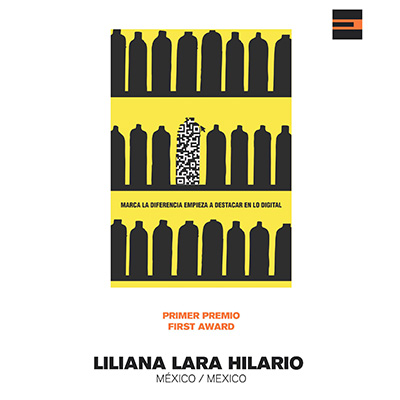
Cofece participated for the third time as co-convener in the International Poster Biennial in Mexico, category E, Unpublished Poster on Competition in the Digital Economy, in which more than 300 proposals were received from designers from around the world, who represented how competition is in the digital environment.
To create their posters, participants used diverse tools and techniques that allowed them to put forward perspectives about competition in the digital economy, showing their creativity and talent to better communicate the benefits and challenges of competition in the digital economy.
The winning posters were by Liliana Lara Hilario, from Mexico, and Yusheng Wang, from China. The finalists' works are on display at the Commission's lobby and at the Franz Mayer Museum. We invite you to come and reflect on this topic.
RECOMMENDED READING
Third Quarterly Report 2022
Cofece published its 2022 Third Quarterly Report, in which it reports on the actions it carried out between July and September, in adherence to its institutional objectives, to generate better competition conditions in the markets and to ensure greater welfare for Mexican families.
Faced with this panorama, Cofece is convinced that it is not enough to guarantee competition and free markets access in the Mexican markets, but that this work must be accompanied by transparency and accountability, to timely provide information on its actions and achievements, so that society is increasingly aware of the Commission's work to promote and protect competition in the markets and to contribute to the welfare of families and to the economic growth of the country.
BY THE NUMBERS
BY THE NUMBERS
In October, the Commission handled 126 matters, of which 65 correspond to concentrations, 33 to procedures for monopolistic practices and concentrations, 5 special procedures and 23 opinions on tenders, concessions or permits.
Complaints, investigations, and trial-like procedures
- Follow-up was made to 7 complaints for anticompetitive conducts, 5 are still under analysis.
- One ex officio investigation of monopolistic practices was initiated, therefore at the end of the period 21 investigations are ongoing.
- 5 trial-like procedures were followed-up, 2 of which concluded with sanctions and 3 are still ongoing.
- Follow-up was made to 4 procedures for barriers to competition.
- 1 resolution on the lack of effective competition conditions was issued in 213 markets for the distribution of LP Gas at the national level.
Concentrations
- 65 concentrations were reviewed, of which 24 were authorized.1
- The amount of the authorized operations is of $1,092,850.7 million Mexican pesos.
Opinions
- During the period, 1 opinion on regulation about common ownership in the hydrocarbons sector.
Amparo trials
- During October, the Judicial Power resolved 9 amparo trials: 4 were granted, 1 was denied and 4 were dismissed2. At the end of the period, 418 trials are still in trial, of which 333 correspond to economic competition matters.





